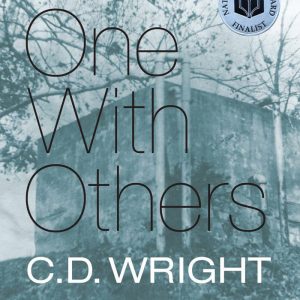calsfoundation@cals.org
One With Others
One With Others is C. D. Wright’s 2010 book of investigative, documentary poetry chronicling the life of her mentor, Margaret Kaelin McHugh, otherwise known as “V.” The “nom de guerre” of V. was given to McHugh by a “gaggle of unsolicited student acolytes,” among them Wright, who took McHugh into their student housing in Memphis, Tennessee, after she was exiled from her hometown in eastern Arkansas for her role in the 1969 March Against Fear from West Memphis (Crittenden County) to Little Rock (Pulaski County).
Taking as its subject the “stuck clock of history,” the book switches between 1969 Big Tree, the fictive name Wright gives V’s hometown, and 2004 Hell’s Kitchen, a Manhattan neighborhood, as V. is dying. While each line and image is clear, Wright continues her traditional method of collage by braiding the two timelines, using prose poetry as well as highly lyrical passages. The content is derived not only from Wright’s own memory, augmented by return trips to eastern Arkansas, but also by news accounts and interviews, some conducted by Wright.
The title, One With Others, provides the frame for this sprawling work. V. was one white Arkansan who chose to embrace the “other” and join with the black marchers. She sealed her fate as an outcast in Big Tree by stepping across the color line and joining forces with the “Invader,” otherwise known as “Sweet Willie Wine,” the black man from Memphis leading the march, whom V. says she would have “followed into hell.” Consequently, V. was disowned by her husband and separated from her seven children. She also lost her home and her station wagon, the car burned to a shell after she used it to carry shoes and water for the marchers. A state patrolman then ushered V. to Memphis and left her in Tennessee, empty-handed, to fend for herself, lest she be harmed in Arkansas and return the nation’s attention to a state that, a dozen years earlier, had seen the desegregation crisis at Central High School involve both the state and national military.
This book is also elegiac, mourning not only V. herself but also a time period in American history when great changes spread across the country and unleashed the potential for progress. It is an accounting of the costs paid by the activists of that time, paid by people like V. Wright’s blending of elegy and documentary accounting create a poetry “which makes it possible for subjects otherwise scrupulously real to seem oddly mythic,” as Dan Chiasson wrote in his review of the book in the New Yorker.
Widely lauded for both style and content, One With Others won the 2010 National Book Critics Circle Award for Poetry, as well as the 2011 Lenore Marshall Poetry Prize, and was a finalist for the 2010 National Book Award for Poetry. Critics such as Craig Morgan Teicher called this a “crucial book,” one that will continue to resonate not only for its blended forms but also for its political content.
For additional information:
“C. D. Wright.” The Academy of American Poets. https://www.poets.org/poetsorg/poet/c-d-wright (accessed October 20, 2020).
Chiasson, Dan. “Southern Discomfort: C.D. Wright’s ‘One with Others.’” New Yorker, January 3, 2011. Online at http://www.newyorker.com/magazine/2011/01/03/southern-discomfort-dan-chiasson (accessed October 20, 2020).
Sandy Longhorn
University of Central Arkansas
 Divergent Prosperity and the Arc of Reform, 1968–2022
Divergent Prosperity and the Arc of Reform, 1968–2022 Literature and Authors
Literature and Authors March Against Fear (1969)
March Against Fear (1969) One With Others
One With Others 



Comments
No comments on this entry yet.